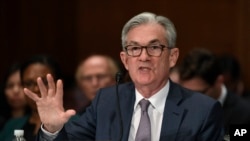In a surprise move, the Federal Reserve cut its benchmark interest rate by a sizable half-percentage point Tuesday in an effort to support the economy in the face of the spreading coronavirus.
Chairman Jerome Powell noted that the virus "poses evolving risks to economic activity."
It was the Fed's first rate cut since last year, when it reduced its key short-term rate three times. It's also the first time the central bank has cut its key rate between policy meetings since the 2008 financial crisis and the largest rate cut since then. Tuesday's rate cut, which the Fed's policy committee backed unanimously, lowered the range of its benchmark rate to a range of 1% to 1.25%.
The Dow Jones Industrial Average, which had been down as much as 356 points shortly before the Fed's announcement, pared its losses later. On Monday, though, the Dow had rocketed up nearly 1,300 points — its largest percentage gain since 2009.
The Fed's announcement of a steep rate cut signaled its growing concern that the coronavirus, which is depressing economic activity across the world, poses an escalating threat and could trigger a recession. Yet even before the Fed's action Tuesday, economists had been cautioning that lower interest rates aren't the ideal prescription for the threat posed by the coronavirus.
Lower rates can lead people and businesses to borrow and spend, which can boost economic activity. But they can't directly address the problems that the virus has caused — from closed factories to canceled business travel to disrupted company supply chains.
"The Fed obviously cannot address the virus itself by cutting rates, but they can hope to short-circuit the potential for a negative response in financial markets that could make the economic impact of the virus even worse,'' said Eric Winograd, senior economist at AB.
Across the world, business is slowing and in some places stopping altogether. Factories in China have been struggling to grind slowly back to life. Many European vacation destinations have been all but deserted as leisure and corporate travel has diminished. And major companies around the world bracing for the risk that the economic landscape could worsen before it improves.
Google told its 8,000 full-time staffers and contractors at its European headquarters in Dublin to work from home Tuesday. Irish news reports have said a Google staffer is being tested for coronavirus. But the company issued only a brief statement that said it's continuing to take precautionary measures to protect the health and safety of its workforce.
The central bank's surprise announcement marked a dramatic shift from last week, when Fed officials in public comments did not seem inclined to support rate cuts even as financial markets endured their biggest losses since the 2008 financial crisis.
"With financial markets in turmoil and evidence growing that the coronavirus is developing into a pandemic, the Fed's change of heart is entirely understandable," said Paul Ashworth, chief U.S. economist for Capital Economics.
Ashworth noted that the Fed's statement Tuesday repeated language it has used in the past that it would "act as appropriate.'' He said this could be a signal that it is leaning toward an additional rate cut perhaps as soon as when officials meet later this month.
President Donald Trump, who has repeatedly attacked the Fed and Powell in particular for not cutting rates more aggressively, doubled down in a new tweet after the Fed's announcement, saying, "More easing and cutting!"
Earlier Tuesday, seven major economies had pledged to use "all appropriate tools" to deal with the spreading coronavirus but announced no immediate actions.
The group of major industrial countries, referred to as the G-7, said it was "ready to take actions, including fiscal measures where appropriate, to aid in the response to the virus and support the economy." The joint statement from the United States, Japan, Germany, Britain, France, Italy and Canada followed an emergency conference call among the finance ministers and central bank presidents, led by Powell and U.S. Treasury Secretary Steven Mnuchin.
The G-7 has issued similar joint statements during periods of extreme market turmoil, such as the Sept. 11, 2001, terrorist attacks and the 2008 financial crisis.
Last week, the Dow plunged 14% from recent highs, its worst week since the 2008 global financial crisis.
"Given the potential impacts of COVID-19 on global growth, we reaffirm our commitment to use all appropriate policy tools to achieve strong, sustainable growth and safeguard against downside risks," the G-7 said.
Global agencies have indicated this week that there will be a significant economic impact as the virus spreads.
On Monday, the Organization for Economic Cooperation and Development said that the coronavirus, which was first detected in China but has now spread to 60 nations in Europe, the U.S., Latin America and other parts of Asia, could cause the world economy to shrink this quarter for the first time since the international financial crisis more than a decade ago.
The OECD lowered its forecasts for global growth in 2020 by half a percentage point, to 2.4% — and said the figure could go as low as 1.5% if the outbreak is sustained and widespread. There are signs that the outbreak has begun to ebb in China.
